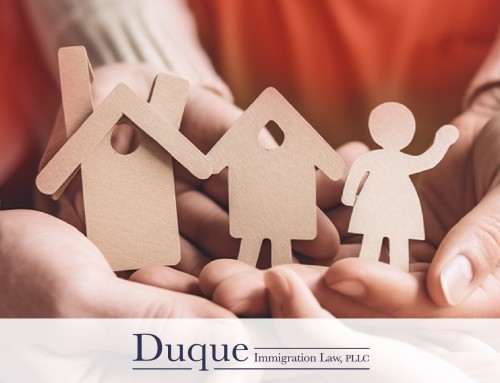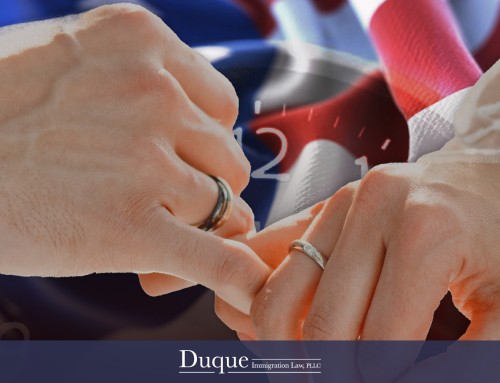If you are a U.S. citizen and are 21 years of age or older, you may file with USCIS (U.S. Citizenship and Immigration Services) a petition for your siblings to live in the United States as lawful permanent residents.
WHO IS CONSIDERED A SIBLING UNDER U.S. IMMIGRATION LAW?
Siblings are persons who have at least one parent in common for immigration purposes. You do not have to be related by blood to your sibling, who may be a stepbrother, stepsister, or adopted brother or sister.
Only U.S. citizens can petition for a sibling to live permanently in the United States.
You may be interested in: Who can a U.S. citizen petition for?
To initiate the petition, you must first correctly fill out the Form-130 (Petition for Alien Relative).
So that there are no mistakes or misunderstandings that unnecessarily delay the process, it is advisable to contact a good immigration attorney who will also review the other required documents and explain how the immigration laws apply to your particular case.
WHAT SHOULD BE INCLUDED IN AN I-130 PETITION?
The following must be attached to the I-130 form:
– A copy of your birth certificate (petitioner).
– A copy of your sibling’s birth certificate.
– Proof of your U.S. citizenship (petitioner).
These documents must be filed with USCIS (U.S. Citizenship and Immigration Services).
WHAT OTHER DOCUMENTS MAY BE REQUIRED?
Birth certificates must show that you and your sibling have at least one parent in common.
If your sibling is related to you by adoption, you must also provide a copy of the adoption decree indicating that the adoption occurred before the adopted child turned 16.
If your sibling is related to you through a stepparent, you must provide proof that the prior marriages of the biological parent and/or stepparent were legally dissolved.
If you and your sibling have the same biological father and different mothers, you must also provide a copy of the marriage certificates and evidence that all other marriages to which either parent was a party have been legally dissolved.
If you or your sibling’s name has changed and is therefore different from the name on the birth certificate, you will need a copy of the document indicating that the name has been legally changed.
HOW LONG DOES IT TAKE TO PROCESS MY SIBLING’S RESIDENCY APPLICATION?
Unfortunately, your brother may not come to the United States right away.
In some cases, you can literally wait for years, but the situation is different for everyone. This is one of the reasons why the knowledge of a family-based immigration attorney can be invaluable; furthermore, immigration law is constantly changing and some of these recent changes have not benefited immigrants or their families.
Family-based immigration has been a particular target of criticism and Congress may impose even more restrictions in the coming months.
If you are thinking about reuniting your family in the United States, now is the best time to start.
WHAT HAPPENS AFTER I FILE THE PETITION?
A few weeks after filing the I-130 petition, you should receive a notice from USCIS asking you to check the USCIS website for a status update. Look for a receipt number in the upper left corner of the message. You will need this number when you log in.
You can also sign up to receive email updates on the progress of your I-130 petition. It may take a few months, but USCIS will at some point approve or, in rare cases, deny your I-130 petition for your sister or brother.
HOW WILL THE FINAL DECISION REGARDING THE GREEN CARD BE MADE?
Finally, if the I-130 is approved, your brother will be asked to attend an interview at a U.S. consulate in his home country. This is where the decision to approve or deny permanent residence is made.
Approved I-130s are sent by USCIS to the National Visa Center (NVC) for further processing.
WHAT IF YOUR I-130 IS DENIED?
If your I-130 petition for your sister or brother is denied, USCIS must explain why in writing. If you receive a denial, talk to your attorney about resubmitting the I-130 or challenging the denial.
A good immigration attorney can review your legal, family and professional situation, explain your options, help you avoid unnecessary delays, and represent and defend your family if necessary.
The help of a good lawyer is your right.
Duque Immigration Law, PLLC, as qualified family-based permanent residency immigration attorneys, we will guide you through your process, and appeal your case if necessary.
Duque Immigration Law, PLLC
Miami, Florida: 1 305 436 0155
Bogotá, Colombia: 57 601 426 3975






 ¿Cómo puedo ayudarle? | How can I help you?
¿Cómo puedo ayudarle? | How can I help you?